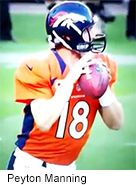- 8 Ways to Increase Dopamine Naturally
- 7 Best Breads for Maintaining Stable Blood Sugar
- Gelatin vs. Collagen: Which is Best for Skin, Nails, and Joints?
- The Long-Term Effects of Daily Turmeric Supplements on Liver Health
- Could Your Grocery Store Meat Be Causing Recurring UTIs?
- Are You Making This Expensive Thermostat Error This Winter?
- Recognizing the Signs of Hypothyroidism
- 10 Strategies to Overcome Insomnia
- Could Artificial Sweeteners Be Aging the Brain Faster?
- Techniques for Soothing Your Nervous System
Star Athletes Often Endorse Junk Food, Study Says


MONDAY, Oct. 7Professional athletes may be known for their fitness, but the foods they endorse are usually less than healthy, a new study finds.
The study found that food and beverages promoted by the likes of Peyton Manning and Serena Williams are most often high in calories and devoid of nutrients. Of 62 food products athletes endorsed in 2010, 79 percent fell into the junk food category. And nearly all athlete-promoted beverages got 100 percent of their calories from sugar.
Experts said the findings, reported online Oct. 7 and in the November print issue of Pediatrics, are not startling.
But they are concerning, in part because athletes are paragons of fitness, said Dr. Michael Rich, a pediatrician and director of the Center on Media and Child Health, in Boston.
“There’s an implicit message that the athletes actually use these products, and that (the products) are healthy,” said Rich, who did not work on the study.
Linking an athlete to a food or drink “could lend it a health halo,” agreed Marie Bragg, the lead researcher on the study and a Ph.D. candidate at Yale University in New Haven, Conn.
The finding that athletes endorse nutritionally suspect foods is no surprise, according to Bragg. “I think everyone has the sense that this is what’s happening, just based on what we see,” she said.
But, she added, this study actually examined the nutritional content of athlete-endorsed foods, and looked at the marketing reach of those ads.
“You see them everywhere — TV, newspapers, magazines, the Internet,” Bragg said. And based on Nielsen data, her team found, teenagers see those TV ads more often than adults do.
That’s troubling, Bragg said, because teenagers often idolize sports stars.
And, Rich added, “kids are much more likely to see TV ads than to read nutrition labels on products.”
For the study, Bragg’s team looked at data on athlete endorsements during 2010. Of 512 brands hawked by 100 athletes, 24 percent were for food and beverages — including McDonald’s, Burger King, Oreos, Pepsi, Mountain Dew and Red Bull.
LeBron James of the Miami Heat (National Basketball Association), Peyton Manning of the Denver Broncos (National Football League) and tennis star Serena Williams were the “highest contributors to the marketing of unhealthy foods,” Bragg’s team reported.
Perhaps not surprisingly, athletes most commonly promoted sports drinks like Gatorade and Powerade. But the researchers considered any drink that gets 100 percent of its calories from sugar as unhealthy — and sports beverages fall into that category.
“Sports drinks are basically soda,” Rich said. But consumers, particularly kids, may view them as health foods, he noted.
The American Beverage Association, which represents the industry, said its members have been careful to avoid targeting young children.
“This study, in fact, reaffirms that children younger than 12 are not the age group primarily viewing food- and beverage-related advertisements that include professional athletes,” the group said in a statement. “Our industry offers consumers a variety of choices to help make informed decisions and we respect parents’ roles as the primary decision makers in choosing what their children consume.”
Rich agreed, saying parents need to be savvy consumers and teach their kids to do the same. He suggested that when an athlete endorsement pops up on your TV screen, talk to your kids about it. “Let them know, just because Peyton Manning is sitting by a jug of Gatorade, that doesn’t mean Gatorade made him what he is today,” Rich said.
Bragg agreed, but “just being aware isn’t enough,” she added.
“Ideally, athletes would stop promoting unhealthy foods,” Bragg said. And if parents are really concerned, she noted, they could “find ways to be vocal about it” — such as supporting nutrition advocacy groups.
What this study cannot say is whether kids, or adults, actually eat more junk food because of athletes’ endorsements. Both Rich and Bragg pointed to the millions of dollars that companies are willing to pay athletes: NBA star Kobe Bryant earned an estimated $12 million per year from his contract with McDonald’s, Bragg’s team wrote.
“If companies are investing that much,” Bragg said, “I think it’s safe to assume there’s a reason.”
More information
The American Psychological Association has more on food ads and child health.
Source: HealthDay
Copyright © 2026 HealthDay. All rights reserved.










